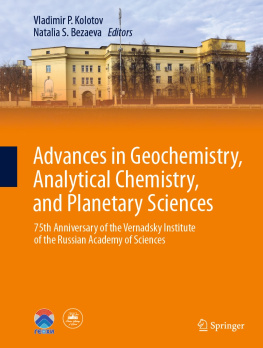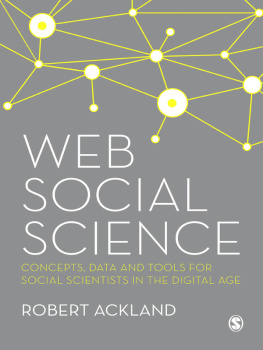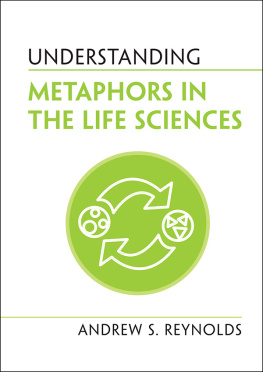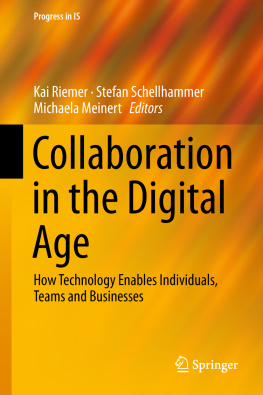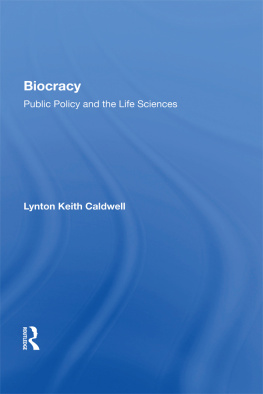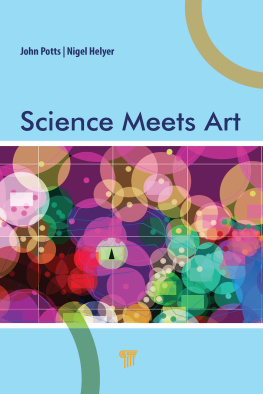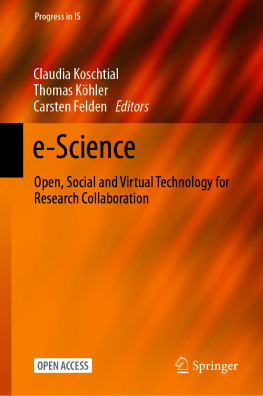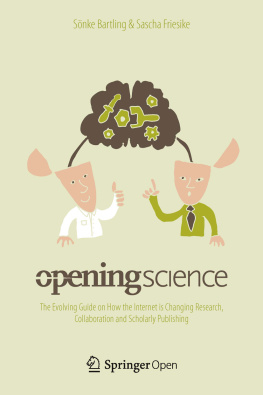COLLABORATION IN THE NEW LIFE SCIENCES
For our mentors
Collaboration in the New Life Sciences
Edited by
JOHN N. PARKER
National Center for Ecological Analysis and Synthesis, USA
NIKI VERMEULEN
Department of Social Studies of Science, University of Vienna, Austria
and
BART PENDERS
Maastricht University and Radboud University Nijmegen, The Netherlands
First published 2010 by Ashgate Publishing
Published 2016 by Routledge
2 Park Square, Milton Park, Abingdon, Oxon OX14 4RN
711 Third Avenue, New York, NY 10017, USA
Routledge is an imprint of the Taylor & Francis Group, an informa business
Copyright 2010 John N. Parker, Niki Vermeulen and Bart Penders
John N. Parker, Niki Vermeulen and Bart Penders have asserted their right under the Copyright, Designs and Patents Act, 1988, to be identified as the editors of this work.
All rights reserved. No part of this book may be reprinted or reproduced or utilised in any form or by any electronic, mechanical, or other means, now known or hereafter invented, including photocopying and recording, or in any information storage or retrieval system, without permission in writing from the publishers.
Notice:
Product or corporate names may be trademarks or registered trademarks, and are used only for identification and explanation without intent to infringe.
British Library Cataloguing in Publication Data
Collaboration in the new life sciences.
1. Life sciences--Research. 2. Intellectual cooperation. 3. Group work in research. 4. Life scientists--Professional relationships.
I. Parker, John N. II. Vermeulen, Niki. III. Penders, Bart.
570.7'2-dc22
Library of Congress Cataloging-in-Publication Data
Parker, John N.
Collaboration in the new life sciences / [edited] by John N. Parker, Niki Vermeulen, and Bart Penders.
p. cm.
Includes bibliographical references and index.
ISBN 978-0-7546-7870-0 (hbk)
1. Life sciences--Social aspects. 2. Cooperation. I. Vermeulen, Niki. II. Penders, Bart. III. Title.
QH333.P37 2010
570.72--dc22
2010017061
ISBN 9780754678700 (hbk)
ISBN 9781315572628 (ebk)
Contents
by Edward J. Hackett
Niki Vermeulen and Bart Penders
Stephen Bocking
Laurens K. Hessels, Stefan de Jong and Harro van Lente
Ann Zimmerman and Bonnie A. Nardi
John N. Parker
Karen S. Baker and Florence Millerand
Vivien Behrens and Matthias Gross
Chunglin Kwa and Ren Rector
Jamie Lewis
Jane Calvert
Lyndal Halliday
Wesley Shrum
List of Figures
List of Tables
List of Contributors
Karen S. Baker is Co-Director of Ocean Informatics, research affiliate of the University of California, San Diego Science Studies Program, and information manager with the Long-Term Ecological Research Program and the California Cooperative Fisheries Investigations at Scripps Institution of Oceanography. Her long-term interests are in data stewardship, information infrastructure and learning environments, unfolding through an informatics engagement with everyday scientific data practices, information systems and community design. Interests in data organization and information management emerge from earlier work in solid state physics, bio-optical oceanography and environmental data analysis.
Vivien Behrens holds a MSc (Diplom-Sozialwissenschaften) in Social Sciences from the Leibniz University of Hannover. After her studies she started as Junior Researcher at the Helmholtz-Centre for Environmental Research (UFZ) in Leipzig and worked in the European research project FRAP (Framework for biodiversity Reconciliation Action Plans) on biodiversity conservation, analysing conflicts between wildlife management and human resource use. She is currently a member of the research training group: Entering the Knowledge Society: Science in Applied and Advisory Contexts at the Institute for Science and Technology Studies (IWT) at Bielefeld University. Her research focuses on different forms of knowledge production and on the strategies which heterogeneous actors develop during a research process in order to come up with innovative problem solving approaches. Her project aims at gaining insights about how scientists operate in innovation projects and how they deal with the changing requirements and standards in research practice.
Stephen Bocking is a Professor of Environmental History and Policy at Trent University, in Peterborough, Canada. His research interests include the history of ecology and environmental science, and the political roles of scientific expertise. Besides many articles and book chapters, his publications include: Natures Experts: Science, Politics, and the Environment (2004), and Ecologists and Environmental Politics: A History of Contemporary Ecology (1997).
Jane Calvert has an undergraduate degree in Human Sciences from the University of Sussex and an MSc in the History and Philosophy of Science from the LSE. She did her doctoral work at Sussex in Science and Technology Studies on the idea of basic research. She started as a Research Fellow at Innogen, University of Edinburgh, in July 2007. Previously she was a Research Fellow at Egenis, University of Exeter, and prior to that at Science and Technology Policy Research (SPRU), University of Sussex. She is currently a visiting fellow at Egenis. Janes broad area of research interest is in the production and commodification of knowledge in the life sciences. She is currently studying the emergence, development and epistemic aspirations of the new fields of systems biology and synthetic biology. She also works on translational research, which relates to her longstanding interest in the meaning and use of policy and scientific categories.
Stefan de Jong is a Junior Researcher at the Science System Assessment department of the Rathenau Institute, The Hague. He holds a BSc in Cell Biology (Wageningen UR) and a MSc in Science and Innovation Management from Utrecht University. Stefans current interests focus on the social impact assessment of academic research and the dynamics of interactions underlying social impact generation. Stefan is involved in the Dutch ERiC project and the European SIAMPI project, which both focus on these topics.
Matthias Gross is Senior Researcher at the Helmholtz-Centre for Environmental Research (UFZ) in Leipzig, and Lecturer (Privatdozent) in Sociology at the Martin Luther University Halle-Wittenberg, Germany. He is the author of five books, most recently Ignorance and Surprise: Science, Society, and Ecological Design (2010), and numerous articles in the fields of environmental sociology, science and technology studies, as well as contaminated sites management. He is co-founder and editor of the interdisciplinary journal, Nature and Culture.
Edward J. Hackett is a Professor in Arizona State Universitys School of Human Evolution and Social Change and former Director of the Division of Social and Economic Sciences at the United States National Science Foundation. He studies the social organization and dynamics of scientific research, asking how different patterns of interaction, leadership, interdisciplinary collaboration and other factors influence the production of knowledge. He has written on many other aspects of science, technology and society, including research misconduct, the scientific career, science and law, university-industry research relations and environmental justice. He also served as lead editor for the latest edition of the


